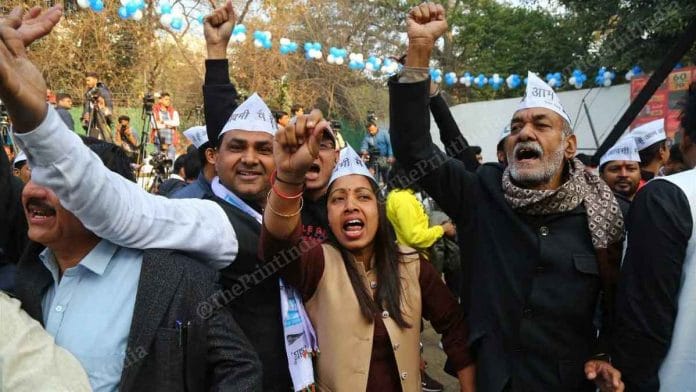New Delhi: Atishi, one of the chief architects of Delhi’s education reforms, was leading against the BJP’s Dharambir Singh by over 9,000 votes in Kalkaji at 3 pm, according to the Election Commission website. News channels NDTV and CNN News 18, however, have already declared her victorious.
One of the eight women candidates fielded by AAP in the Delhi assembly elections this year, Atishi was among the the party’s faces of these polls.
Atishi, who has served as an adviser to Education Minister Manish Sisodia, has been part of AAP since January 2013, when she became involved in the party’s policy formulation. She is also a member of the AAP’s political affairs committee.
Atishi was in a triangular contest with Shivani Chopra of the Congress and Dharamveer Singh of the BJP.
While Chopra, the younger daughter of three-time Congress MLA and its Delhi unit chief Subhash Chopra, was hopeful of leveraging the party veteran’s legacy, she is a distant third in the constituency. As of 2.45 pm, Chopra had managed a mere 4,688 votes.
Also read: Shaheen Bagh effect? BJP’s Braham Singh ahead of AAP leader Amanatullah Khan in Okhla
Campaigned on education, health
Atishi made her electoral debut in the 2019 Lok Sabha polls from East Delhi, where she was defeated by cricketer-turned-politician Gautam Gambhir as the BJP swept Delhi winning all the seven seats.
In the run-up to the elections in 2018, Atishi dropped her surname Marlena — she said it was a combination of Karl Marx and Vladimir Lenin and coined by her parents — leading to a row as reports suggested that she was told to drop it from her Twitter handle because it “sounded Christian”.
The AAP had denied the reports, but it had led Atishi to clarify that her real surname was Singh, that she belonged to a “Punjabi Hindu family” and that she is a “Chhatriya”.
Born to Delhi University professors Vijay Singh and Tripta Wahi, she graduated in history from St Stephen’s College, Delhi, in 2001 before she went to the University of Oxford as a Rhodes Scholar.
Atishi, who has been a resident of Jangpura Extension, where her parents live, has, of late, been staying in a rented house at Kalkaji’s L-block.
38-year-old Atishi maintained during her campaign that education and health have been two of the main components of the Arvind Kejriwal government, besides women empowerment.
“AAP, in the past five years, relentlessly fought to achieve what other states and governments couldn’t and will continue to do so as promise in AAP’s guarantee card,” she said throughout her campaign and roadshows in Kalkaji.
Even slogans that played out on her campaign trucks highlighted how she worked for the education department on a token salary of Re 1 and how she is Kejirwal’s most dependable colleague.
Kalkaji has a diverse population
The Kalkaji constituency in South East Delhi district has 1,85,837 voters — 1,03,535 men, 82,296 women and six transgenders, according to data shared by the Election Commission. The constituency has a diverse mix of people, including Purvanchalis, Sikh refugees, slum and jhuggi-jhopri dwellers.
In 2015, AAP’s Avtar Singh had won the Kalkaji seat, while BJP’s Harmeet Singh had won it in 2013.
The constituency is largely urbanised with a mix of middle and upper middle-class households in areas such as Maharani Bagh, parts of New Friends Colony and Friends Colony (East and West), Kalkaji, parts of East of Kailash and Sukhdev Vihar.
The assembly seat has three villages — Kalka Garhi, Sarai Julena and Bharat Nagar — mostly inhabited by the Gujjar community, besides the slum clusters.
Also read: Early trends show Kejriwal’s AAP in the lead, BJP ahead in Okhla






